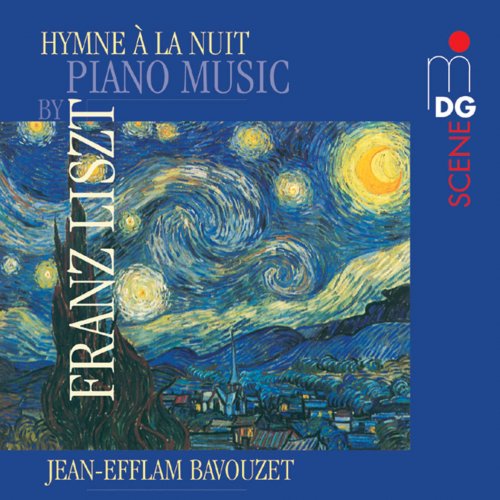
Jean-Efflam Bavouzet - Liszt: Piano Music (2005)
BAND/ARTIST: Jean-Efflam Bavouzet
- Title: Liszt: Piano Music
- Year Of Release: 2005
- Label: Musikproduktion Dabringhaus und Grimm (MDG)
- Genre: Classical Piano
- Quality: flac lossless (tracks)
- Total Time: 01:15:17
- Total Size: 206 mb
- WebSite: Album Preview
Tracklist
01. Invocation
02. Hymne a la nuit
03. Lullaby - Chant du berceau
04. Schlaflos! Frage und Antwort
05. Grosses Konzertsolo
06. Bagatelle (Mefisto Valse No. 4)
07. La Notte
08. Trauervorspiel und Trauermarsch
09. Hymne du matin
10. Tristan und Isolde: Vorspiel
11. Isoldens Liebestod (Arr. for Piano)
12. En rêve: Nocturne
Hats off! A genius Liszt player! Not only does Jean-Efflam Bavouzet possess a perfect technique, but he also commands the huge, varied sonority and narrative power needed to make Liszt’s complex idiom come brilliantly alive. All the great dead Liszt players knew how to balance tremolos, arpeggios, and similar background devices against melodic components so that the textures would sing out with variety and color, emerge in proper perspective, and never, ever bog down. They also knew to serve Liszt’s “stagy” lyrical inspirations wholeheartedly and generously. Bavouzet knows these secrets, and has totally internalized them. That’s why the Invocation’s bass rumbles and rattling tremolos sound uplifting rather than bombastic (the same goes for the ending of the gorgeously paced Wagner/Liszt Liebestod), or why En réve’s lyric simplicity sounds contained and dignified rather than mawkish.
The Grosses Konzertsolo, a prototype for Liszt’s two-piano Concerto Pathétique, receives a blazing, utterly inspired reading where fire and poetry lock horns and never let up. It puts all other recorded performances of this piece in the shade (not that there’ve been that many, I admit). Similarly, the rarely heard La Notte boasts such high levels of pianistic finish and stylish elegance that you’ll never need to hear the piece in its orchestral version again–that is, if you’ve heard it, ever! As for being an orchestra, and a sexy one at that, look no further than Bavouzet’s remarkable playing of Wagner’s Prelude to Tristan und Isolde in Zoltan Kocsis’ transcription.
Conversely, the bleak, anti-virtuosic sound world of late Liszt also sparks Bavouzet’s imagination. For example, he judges the odd chromatic twists and turns of Schlaflos in a more fluid fashion than Paul Lewis’ fine recording on Harmonia Mundi. Although the excellent annotations do not mention the instrument, the sound of the piano itself leads me to suspect that Bavouzet employs the same vintage 1901 Steinway he used in his MDG Ravel cycle. It relates to a modern American Steinway much as a hand-carved oakwood table does to a factory-made Formica copy. The harp-like, disembodied quality of soft, rippling passages suggests the “piano without hammers” of Debussy’s ideal. No doubt Liszt would have liked it too, and possibly would have enjoyed Bavouzet’s meaningful, committed and loving interpretations even more. A very special disc, not to be missed.
01. Invocation
02. Hymne a la nuit
03. Lullaby - Chant du berceau
04. Schlaflos! Frage und Antwort
05. Grosses Konzertsolo
06. Bagatelle (Mefisto Valse No. 4)
07. La Notte
08. Trauervorspiel und Trauermarsch
09. Hymne du matin
10. Tristan und Isolde: Vorspiel
11. Isoldens Liebestod (Arr. for Piano)
12. En rêve: Nocturne
Hats off! A genius Liszt player! Not only does Jean-Efflam Bavouzet possess a perfect technique, but he also commands the huge, varied sonority and narrative power needed to make Liszt’s complex idiom come brilliantly alive. All the great dead Liszt players knew how to balance tremolos, arpeggios, and similar background devices against melodic components so that the textures would sing out with variety and color, emerge in proper perspective, and never, ever bog down. They also knew to serve Liszt’s “stagy” lyrical inspirations wholeheartedly and generously. Bavouzet knows these secrets, and has totally internalized them. That’s why the Invocation’s bass rumbles and rattling tremolos sound uplifting rather than bombastic (the same goes for the ending of the gorgeously paced Wagner/Liszt Liebestod), or why En réve’s lyric simplicity sounds contained and dignified rather than mawkish.
The Grosses Konzertsolo, a prototype for Liszt’s two-piano Concerto Pathétique, receives a blazing, utterly inspired reading where fire and poetry lock horns and never let up. It puts all other recorded performances of this piece in the shade (not that there’ve been that many, I admit). Similarly, the rarely heard La Notte boasts such high levels of pianistic finish and stylish elegance that you’ll never need to hear the piece in its orchestral version again–that is, if you’ve heard it, ever! As for being an orchestra, and a sexy one at that, look no further than Bavouzet’s remarkable playing of Wagner’s Prelude to Tristan und Isolde in Zoltan Kocsis’ transcription.
Conversely, the bleak, anti-virtuosic sound world of late Liszt also sparks Bavouzet’s imagination. For example, he judges the odd chromatic twists and turns of Schlaflos in a more fluid fashion than Paul Lewis’ fine recording on Harmonia Mundi. Although the excellent annotations do not mention the instrument, the sound of the piano itself leads me to suspect that Bavouzet employs the same vintage 1901 Steinway he used in his MDG Ravel cycle. It relates to a modern American Steinway much as a hand-carved oakwood table does to a factory-made Formica copy. The harp-like, disembodied quality of soft, rippling passages suggests the “piano without hammers” of Debussy’s ideal. No doubt Liszt would have liked it too, and possibly would have enjoyed Bavouzet’s meaningful, committed and loving interpretations even more. A very special disc, not to be missed.
As a ISRA.CLOUD's PREMIUM member you will have the following benefits:
- Unlimited high speed downloads
- Download directly without waiting time
- Unlimited parallel downloads
- Support for download accelerators
- No advertising
- Resume broken downloads


